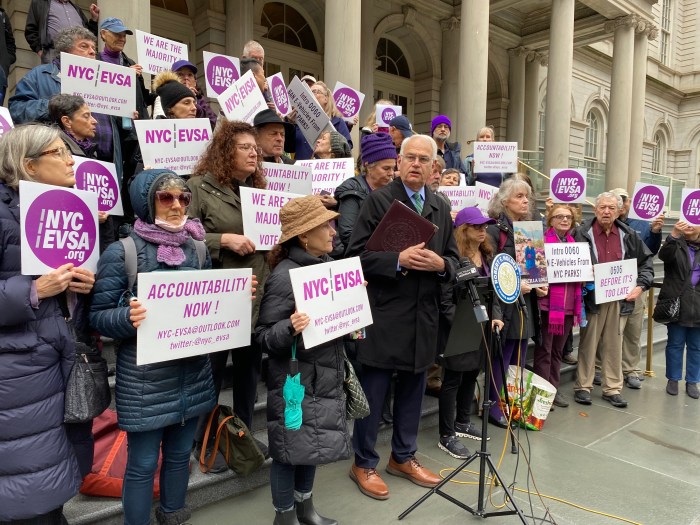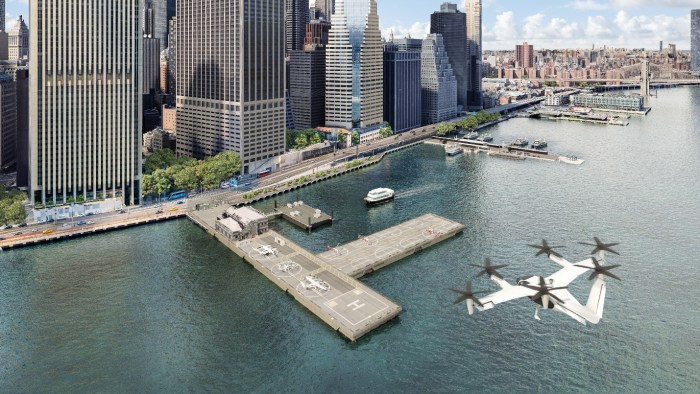
New York City has confiscated more illegal motorized bicycles so far this year than it did during all of 2016.
The huge uptick in NYPD enforcement has led to 687 seizures of the e-bikes in 2017, compared with just 551 confiscations last year. Despite the spike, Thomas Chan, the NYPD’s Transportation Bureau chief, maintained it’s part of a general springtime bicycle ticketing blitz.
“As we start getting into the biking season … we’re going to have more people out there and we’re going to do enforcement,” Chan said. “It is an area that we have to stay on top of. That’s an area we’ll continue to do enforcement in.”
Often mistaken for scooters or mopeds, e-bikes more closely resemble actual bicycles. Generally, they look no different than your average bike — except for a small motor attached to the frame. Confiscated e-bikes are returned to their owner after a court hearing and payment of a $500 summons.
The bikes are increasingly popular in European cities and legal in states such as California and Massachusetts. But most classes of e-bikes are illegal in New York.
The laws are murky. The federal government permits the sale of bicycles that, when powered exclusively by a motor, have a maximum speed of less than 20 mph. But those same bikes are illegal to operate on New York streets.
Still, the bikes are commonly used among delivery workers in the city, often immigrants, who rely on the added kick of a low-wattage motor to get through grueling, low-pay shifts each day. Helen Ho, a co-founder of the Biking Public Project, which advocates for immigrant cyclists, worries that that the crackdown unfairly targets and burdens these workers.
“We’re talking about the nexus of the most vulnerable New Yorkers here,” Ho said. “These workers might not speak English; they’re not very well organized. They’re often pulled over and ticketed and don’t know why. … With these bikes being illegal, you’re creating another low-level crime.”
Chan denied charges that enforcement targets specific neighborhoods or riders. The crackdown is part of the NYPD’s contribution to Vision Zero, one of Mayor Bill de Blasio’s signature initiatives to eliminate all traffic deaths.Under that goal, Manhattan police took 247 e-bikes off the road in a 24-hour window late last month.
“We encourage our officers — especially if the bicycle or e-bike [riders], if they’re going the wrong way — we should be writing the summons,” he said. “These dangerous habits, these are Vision Zero incidents where we can prevent serious injuries to people and also fatalities.”
Chan added that enforcement is “quite often as a result of community complaints.”
During a recent meeting with the Biking Public Project, five immigrant delivery cyclists, speaking through an interpreter, described the stresses of the job, the fines and the loss of wages that they risk by riding e-bikes. The cyclists rack up between $1,500 and $2,200 in fines per year on top of the wages lost by days spent in court — sometimes where there is no interpreter who speaks Chinese, they said.
Lam Fai, 55, of Sunset Park said that, until the recent blitz, he used an e-bike to reduce the stress on his bad back. Plenty of older workers need the bikes to get through a typical shift that can keep them on their bike for ten hours, covering 60 miles each day.
“There’s the expression the knife is not at fault for killing people. It’s just like an electric bike. It’s a tool that we use. It’s beneficial for our health,” he said.
Cycling advocates are at odds with the NYPD over its general stance on e-bikes and the spring enforcement blitz, which Paul Steely White, executive director of Transportation Alternatives, called an “embarrassment.”
“The NYPD is giving Vision Zero a bad name,” he said. “Yes, we all agree that cyclists should follow traffic laws, but Vision Zero is not about cracking down on cyclists because you think it’s a good idea. It’s about deploying limited police resources based on data. There’s no indication that this blitz is informed by any empirical data that would show that the bikes are a threat.”
Currently, only “pedal assist” e-bikes are actually classified as bicycles in New York City, meaning they are legal to operate on city streets. The de Blasio administration effectively squashed legislation in 2015 to expand the definition to include other forms of e-bikes, citing safety concerns.
State Sen. Martin Malavé Dilan, a Democrat representing Brooklyn, said he is confident the city will come around to legislation he sponsored this year that would define e-bikes with a motor of 750 watts, traveling at a speed of 20 mph, as legal bicycles.
“There’s a national definition, but basically there needs to be clarification of what an e-bike is” in New York, Dilan said. “These bikes are handy for people with disabilities, senior citizens, or people who struggle to ride bikes up hills.”
































